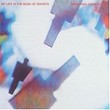|
|

Speakers' corner Following up our retro scope series of 2006 and 2007, 2009 and 2010 - here's the ever-continuing, never-stopping New Speakers' corner! Luna Kafé's focused eye on great events, fantastic happenings, absolute milestones, or other curious incidents from the historic shelves/vaults of rock. This moonth the Lunar spotlight has captured a 30 year old spirited collaboration between two indeed prominemt gentlemen from the upper shelf of popular music - from the early 1970s till now. One of them was (as mentioned last moonth) saluted by acclaimed retro-pop-heads MGMT on their Congratulations, with the song "Brian Eno". Well, spin the album again: "....Do you hear voices? You do, so you are possessed. You are a believer, born again. And yet you hear voices and you are possessed. Ok, are you ready to give us a listen?"
Brian Eno & David Byrne Throughout his career in the 1970s, from the early Roxy Music, solo albums with highly original songs - the closest successor to Syd Barrett if ever there was one, experimental soundscapes with Robert Fripp of King Crimson fame and German kraut-rock legends Cluster, the inventor of ambient music, collaboration with David Bowie through his second creative peak - the Berlin period (Low, Heroes and Lodger), and already a renowned producer, Brian Peter George St. John le Baptiste de la Salle Eno had established himself as a kind of musical demi-god. At least that was my opinion by the turn of the decade. His collaboration with trumpeter Jon Hassell in 1980 on the album Fourth World, Vol. 1: Possible Musics, increased the impression. Here they explored some ambient-experimental-futuristic-ethnic music beyond both the first, second and third world. Eno had discovered New York's finest young rock band Talking Heads at a quite early stage and co-produced their second, third and fourth album. So the news that Talking Heads' front man David Byrne and Eno was working on an album together was no big surprise. But the contents of the work really were. The recordings started with the vocals, sung or spoken, taken from obscure records (got that one?) of folk music from the Middle East, Algeria and Georgia and voices recorded from American radio and treated by our heroes. A radio host, a smooth politician, a reverend and an evangelist. There's even the voice of an unidentified exorcist in New York. At the time of the release, at least, there were rumours saying it was recorded in the apartment next door, through the wall. Many of the tracks are equipped with danceable beats, sharp guitars, ditto synthesizers and funky basses. Not least the aforementioned exorcist number "The Jezebel Spirit" that was also released as the single off the album. Some rhythms are more in the ethnic (African) vein and "Regiment" stands out with conventional rock drums by Chris Frantz of the Heads. The soaring song from Dunya Yusin, a Lebanese mountain singer, and a guitar in the same vein, not unlike the Robert Fripp guitar sound of that era, turns it into the highlight of the album for me. "Mea Culpa" includes scratching rhythmic elements, relatively unheard of at the time. Towards the end of the album the rhythms are less dominant and the tempo is slowed down. A couple of tracks are quite close to Eno's ambient excesses. The voices have been manipulated here & there, treated with sound effects and sometimes cut up, a forerunner of sampling. The vocals of Egyptian Samira Tewfik in "A Secret Life" have even got an effect similar to Jon Hassell's trumpet on the aforementioned Fourth World, Vol. 1 album. The track "Qu'ran", where Algerian Muslims recite from the Koran, was removed from the album after the Islamic Council of Great Britain had intervened. They considered the way our duo had treated words from the Holy Book with groovy rhythms a blasphemy. Later editions included the somewhat more anonymous "Very, Very Hungry" instead, the B-side of "The Jezebel Spirit" single. Which is a shame since "Qu'ran" really is one of the more groovy tracks with a haunting synth (I think) that keeps going and going and along with the chanting might've put the listener in a trance if the song had lasted longer than three minutes and fortyfive seconds. Listening to My Life... today, it doesn't sound as stunning any more. The recording approach was quite revolutionary at the time. In the intervening years, lots and lots of artists have used the recording techniques from the production, not least the dance, techno and even hip hop of the later 1980s and 1990s. In that respect My Life... stands out as one of the most influential records of the last 30 years. In Norway Lasse Myrvold treated the prime minister's New Year's speech with rhythms and instruments a couple of years later (the LP The Willkoks Talk). New technology has made it a lot easier to produce what Eno & Byrne struggled with the analogue way (trial and error...) back then. The duo's next joint venture, Everything That Happens Will Happen Today, 27.5 years later, is also worth checking out, though it's a much more conventional album. Copyright © 2011 JP
|
| © 2011 Luna Kafé |
